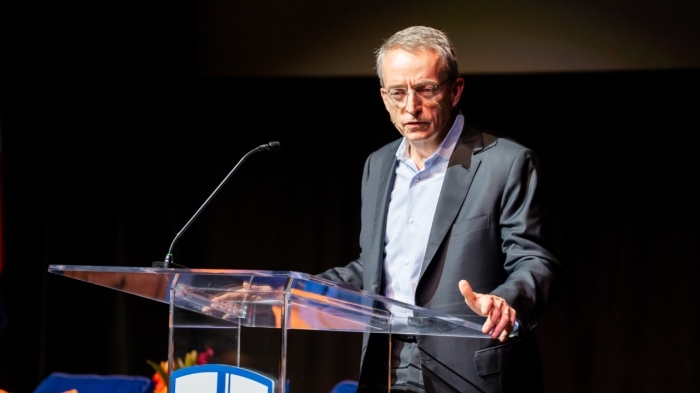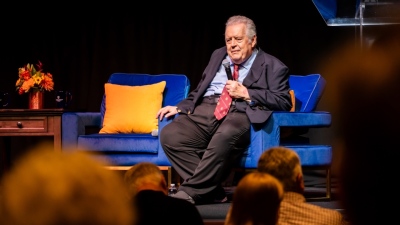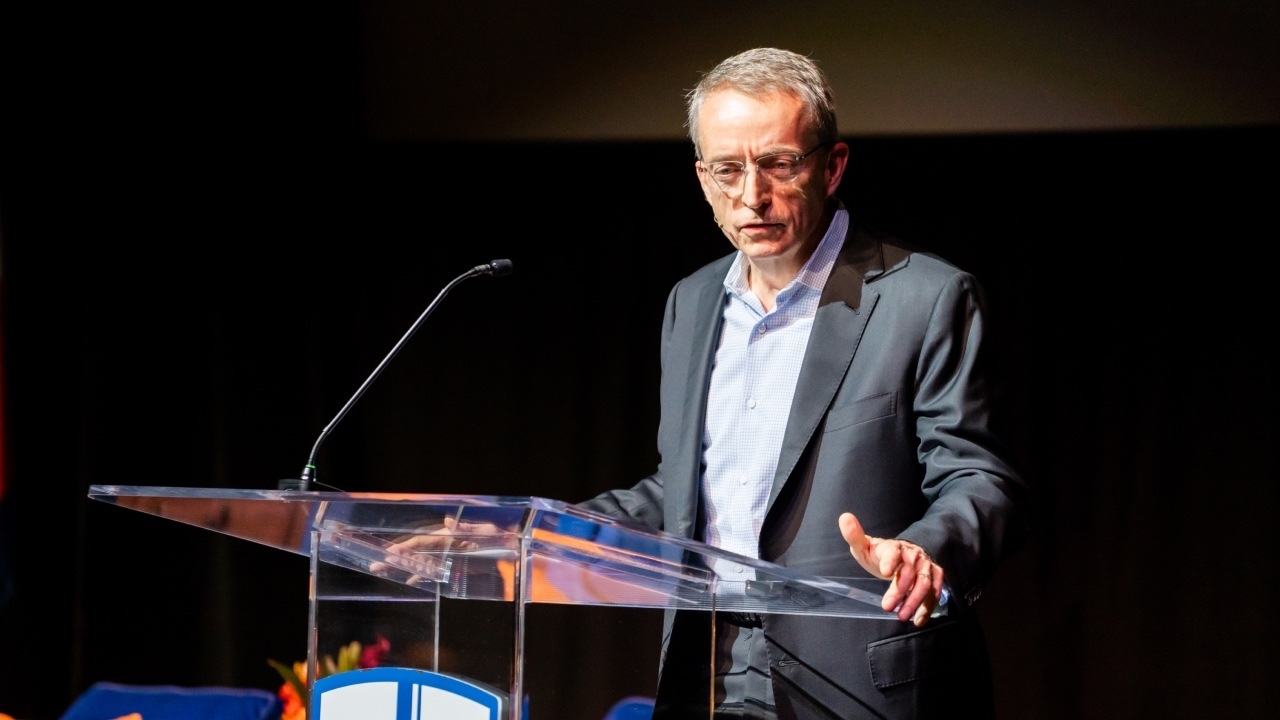
LITTLETON, Colo. — The former CEO of Intel exhorted an audience of Christians earlier this week to harness the burgeoning potential of AI technology, which he hopes can become "a force for good in this era."
"I believe deeply that technology is neutral," said Pat Gelsinger, who led Intel from 2021 to 2024 and now serves as executive chair and head of technology at Gloo, a technology platform that connects various organizations within the faith ecosystem.
"It's neither good nor bad," Gelsinger said of AI during his keynote address to hundreds at "AI for Humanity: Navigating Ethics and Morality for a Flourishing Future," which The Christian Post and Gloo hosted Tuesday at Colorado Christian University.
"It's how we shape it, how we use it, how we form it," he said. "And we, as the Christian community, we as believers, will we be shaping technology as a force for good? Are we going to show up to be bending the arc of technology for good?"
'We must be engaged'
Dr. Richard Land, executive editor of The Christian Post and president emeritus of Southern Evangelical Seminary in Charlotte, North Carolina, shared his thoughts before Gelsinger took the stage about the potentially seismic consequences of AI. He urged Christians to be engaged with the cutting edge of technology, warning it could serve both good and evil purposes.
"This is the greatest, most significant invention since the invention of the printing press," he said of AI. "Gutenberg's invention of the printing press was considered the most significant event in the second millennium, between 1000 and 2000 A.D., and it's hard to argue with that."
Land noted the printing press led to an explosion of knowledge, paved the way for the Protestant Reformation and ultimately made the modern world, but noted that it also led to "a tremendous conflict that is still going on."
Land argued that the legacy of the printing press was double-edged, shattering the hegemony of the Roman Catholic Church by allowing many to unearth the Gospel and the teachings of the early church. But he said it also opened the door to the dissemination of the pagan Greco-Roman philosophy that led to the Enlightenment and the French Revolution, which ultimately led to negative consequences and plunged Europe into war.

"The struggle between the Enlightenment and the Reformation ended up in the American Revolution, which emphasized the Reformation, and the French Revolution, which emphasized the Enlightenment," he said, recounting that Notre Dame Cathedral in Paris was desecrated during the French Revolution by an actress who was enthroned on the high altar as "the goddess of Reason."
"We don't need God," Land described the attitude of the revolutionaries who upended French society before the outbreak of the Napoleonic Wars. He warned that AI threatens to engender the same dangerous hubris and stressed the importance of using technology wisely.
"It's a modern Tower of Babel: we're going to build our way back to Heaven," he said of mankind's common attitude toward technological achievements. "And that struggle went on, and it's continuing to go on. And now the next chapter is AI. We must be engaged. Otherwise we will find it dehumanizing us, dehumanizing human beings all across the globe."
"We will be losing the battle of the machine, the soulless machine, unless all of us stand up and proclaim the unique value of every single human being, because we are created in the image of God, and we are better than machines."
'Another Gutenberg moment'
Gelsinger, a Christian who was the chief architect of a significant Intel microprocessor and played a leading role in developing USB and WiFi technology, expressed optimism that God will use AI technology to fulfill His purposes, just as He used other great inventions throughout history.
"When Christ was on the earth, the greatest technology was the Roman roads," he said, noting that the ancient highway system played a pivotal role in promoting the Gospel throughout the civilized world.
Echoing Land, Gelsinger also likened the advent of AI and its potential to Johannes Gutenberg's invention of the printing press more than half a millennium ago. He noted the printing press allowed Martin Luther to translate the Bible into German for the common people and "began the greatest period of human invention."
"It changed geopolitics, created education, laid the foundation for the Renaissance," he said. "It was an extraordinary period of history, led by a plump little monk and the greatest entrepreneur of the day, Gutenberg."
"I think of AI as another Gutenberg moment, with all the controversies and all the challenges associated with it," he said.
Christians of that time "embraced that great invention of the day to literally change humanity," he said, and urged Christians of today to be just as active in utilizing AI.
'A force for good'
Gelsinger highlighted openness, building trust and licensing as three principles by which he believes AI technology can be shaped as a force for good. He contrasted open AI, which shares models and code for transparency that allows for community involvement, with closed AI, which keeps models private for better performance and company control while hiding how it works.
Gelsinger stressed the importance of "building in the open, living transparently, making sure our data sets and processes are open and understood by all."
Setting benchmarks for AI that emphasize human flourishing is also fundamental, said Gelsinger, whose company Gloo established an evaluation framework for AI models that focuses on actively promoting human welfare. He also noted the importance of honoring intellectual property as protected by the U.S. Constitution.
Gelsinger said AI could reduce poverty and improve education around the world for millions who would otherwise have no opportunities, which he noted is a goal that is relevant to Christians.
"One of my moonshots that I have before I leave this earth is that we will be able to educate every child on the planet," he said, noting that about 90% of humanity will likely have Internet access within the next five years.
Of the approximately 7,000 languages in the world, Gelsinger said only 1,000 languages are easily translated, but he suggested AI will help to unlock the others.
"Almost everybody living in extreme poverty lives in the other 6,000 languages," he said. "AI will enable us to conquer the other 6,000. So literally since Babel, we will have conquered language through AI for the first time."
He noted that approximately 300 million children live in poverty globally, but expressed hope that AI could someday aid in teaching every child in their native language. He said what might have taken a linguist 30 years to accomplish can now feasibly be done in three months with AI.
"I believe that's the single most powerful thing that we can do to eliminate poverty," he said. "I believe that's possible in our lifetime."
"Do you think the heart of our Lord Jesus Christ would be honored if His church did that?" he asked. "I do. And those are the kind of things that we will be able to do when we take AI on mission with us."
Gelsinger closed by urging Christians "not to be afraid of [AI], but to run right to it and find ways that we are in the front seat of shaping this technology as a force for good."
News Source : https://www.christianpost.com/news/former-intel-ceo-pat-gelsinger-urges-christians-to-harness-ai.html
 Your post is being uploaded. Please don't close or refresh the page.
Your post is being uploaded. Please don't close or refresh the page.





